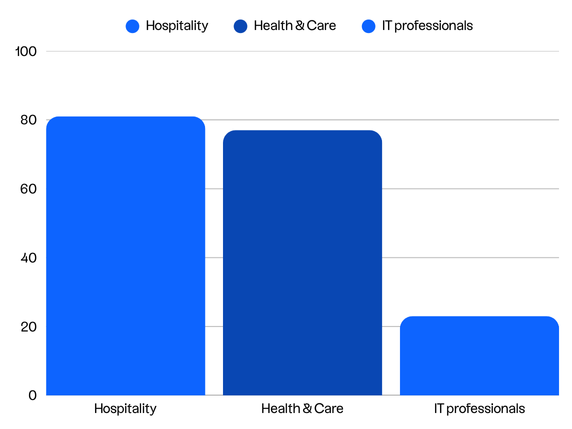The latest Home Office figures for the year ending June 2025 show a sharp decline in the number of visas granted to overseas workers. For many employers, particularly in sectors already facing shortages, the figures confirm what they have been experiencing for months: recruiting internationally is becoming harder, more expensive and more uncertain.
What the numbers tell us

Overall, visas for overseas workers fell by more than a third compared to the previous year. The most striking change is in the health and care sector, where grants of care worker visas dropped by over 77%. Nursing roles and personal carers were particularly affected.
Hospitality employers also felt the squeeze, with visa approvals for chefs and food preparation roles down by more than 80%. Even the IT sector, traditionally reliant on skilled overseas talent, saw visa numbers fall by nearly a quarter.
Alongside fewer grants, refusals are also rising. Around one in five visa applications are now being refused, often because of stricter salary thresholds and compliance checks. On top of this, the number of sponsor licence suspensions and revocations reached record levels in early 2025, showing that the Home Office is taking a tougher stance on compliance.
The impact for SMEs
For small and medium-sized businesses, the impact is significant. Many do not have the resources of larger employers to absorb higher sponsorship costs, manage complex compliance requirements, or plug gaps with agency staff.
The changes are most acute in social care, where vacancies are already running at nearly three times the national average. The knock-on effect is also being felt in hospitality, technology and other sectors too. The risk is not just unfilled vacancies but disruption to service delivery, higher recruitment costs, and added pressure on existing staff.
How employers can respond
While the direction of government policy is clear - reducing reliance on overseas workers - employers still have options to protect their business and plan for the future.
First, it is vital to stay compliant. If you hold a sponsor licence, make sure your right-to-work checks and record-keeping processes are up to date. With Home Office inspections and suspensions or revocations on the rise, an audit now could prevent costly disruption later.
Look at how you can diversify recruitment. Some employers are exploring temporary visa routes, student workers or cross-border remote hires where appropriate. Others are focusing on longer-term solutions, such as apprenticeships and partnerships with colleges to develop a domestic pipeline of talent.
Finally, factor compliance and sponsorship costs into your planning. The administrative and financial burden of hiring overseas staff has increased, and for many businesses it will now be part of the cost of growth.
Looking ahead
The figures highlight a major shift in the UK’s approach to immigration. The challenge is not only to manage today’s recruitment difficulties but to prepare for a future where international hiring is more tightly controlled. Those who invest in compliance, explore creative staffing models and build domestic talent strategies will be best placed to adapt.
If your business is struggling with immigration compliance or planning for workforce shortages, our business immigration solicitors can help. We advise businesses on sponsor licence management, recruitment strategies and right-to-work compliance, so you can stay focused on running your business.







